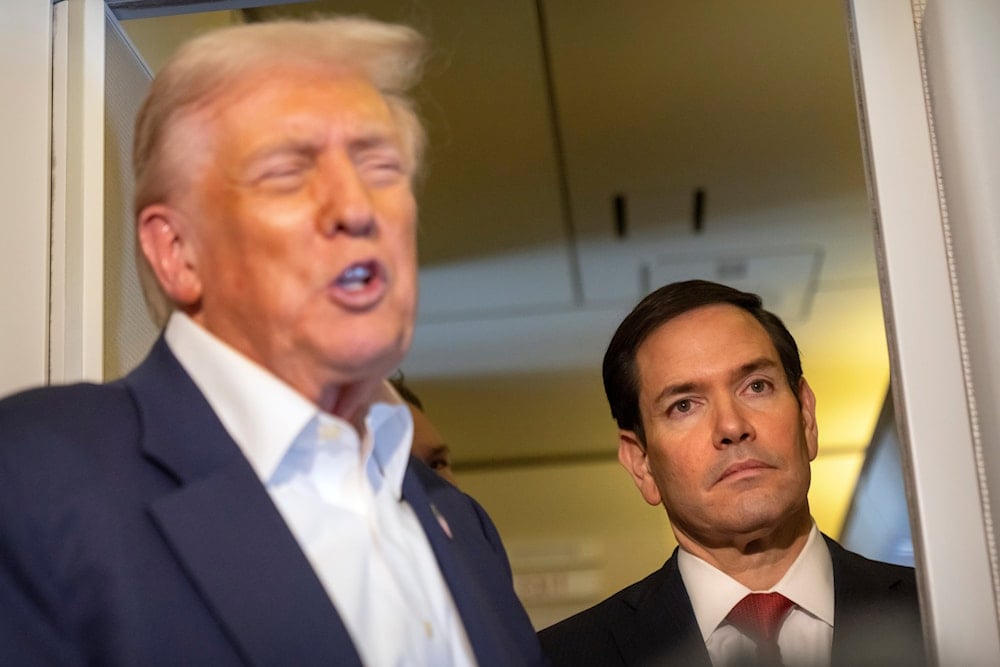Intel reports put to question US claims on Venezuela, drug-trafficking
The United States is intensifying its campaign against Venezuela while expanding operations to Colombia and Mexico under the pretext of combating drug trafficking.
-

US Secretary of State Marco Rubio, right, listens as US President Donald Trump, left, speaks to reporters aboard Air Force One while traveling from Kuala Lumpur, Malaysia, to Tokyo, Japan, on October 27, 2025 (AP)
Recent reports indicate that the United States is intensifying its campaign against Venezuela, aiming to expand operations to Colombia and Mexico, citing drug trafficking concerns as a pretext.
Rubio pushes for regime change
According to a Dropsite News investigation, US Secretary of State Marco Rubio has advanced a broader strategy aimed at Venezuelan regime change. Yet, Rubio and other officials who linked President Nicolas Maduro’s government to alleged narcotics smuggling received a blow when US intelligence assessments delivered to US President Donald Trump found that Venezuela contributes minimally to the US fentanyl supply.
US looks for targets in Colombia, Mexico
Looking for alternatives, Rubio's strategy reportedly included targeting cartel-linked sites in Colombia and Mexico, signaling a regional expansion of US interference. The reason to expand operations, according to Dropsite News, was because of "Venezuela's lack of significant involvement in the drug trade."
The news outlet explained that when tasked with pinpointing ground targets for US forces, the intelligence community largely located sites in Colombia and Mexico and some along the Venezuela-Colombia border, where the state maintains little to no presence.
Read more: Venezuela’s 2025 drug crackdown: 402 aircrafts, 56 tons seized
Trump administration considers ground strikes
High-level discussions in early October reportedly considered land-based strikes against suspected drug sites, signaling a further escalation of US interference in the region. This comes after at least 15 US strikes targeted boats, mostly in the Caribbean, which Washington accused of drug trafficking despite providing no evidence.
Senators Lindsey Graham and Todd Young were briefed on the meetings, with Graham advocating for expanded operations to counter so-called "narco-terrorist" threats.
However, senior military and legal officials raised concerns over the legality and implications of such operations, reflecting internal disagreements within US security circles.
"Pentagon lawyers declined to show up for a closed-door House-side briefing to discuss the legal rationale for the airstrikes on boats," Dropsite reported, citing sources.
Read more: US imposes flight restrictions off Puerto Rico under Pentagon orders
Internal military tensions
The Dropsite News report notes rising tensions within the US military, with top officials, including SOUTHCOM Commander Admiral Alvin Holsey and Lieutenant General JP McGee, reportedly stepping down amid disputes with Secretary of War Pete Hegseth over Caribbean and regional military policy. Pentagon lawyers reportedly avoided some briefings due to legal concerns surrounding potential strikes.
McGee reported directly to the chairman of the Joint Chiefs of Staff and was responsible for implementing policy.
"I know he was uncomfortable with this," a source close to McGee told Dropsite.
Meanwhile, CNN reported that McGee was pushed out of his position for disagreements with Hegseth on Caribbean policy, an assertion that the Pentagon rejects as "100% fake news."
Wider context
The United States initiated its aggressive interference in the region by committing swaths of forces, including a carrier strike group. On September 2, the US launched its first drone strike on a boat in the Caribbean, killing 11 people. Since then, Washington continues to accuse Maduro and Caracas of leading drug-trafficking and of "invading" the US with migrants. In total, 13 strikes targeted boats in the Caribbean and two strikes were conducted in the East Pacific. At least 64 people have been killed so far by these US strikes.
However, intelligence reports showed that drug-trafficking claims were false, while Maduro pointed to US-funded advertisements throughout Latin American media, encouraging Venezuelan migration.
In one case, Dropsite News reported that a grant required a Colombian newspaper, El País, to "document and make visible success stories of migrants accessing the formal market, using formats and media regularly consulted by business groups."
Read more: Moscow reaffirms support for Venezuela leadership amid US threats

 4 Min Read
4 Min Read








